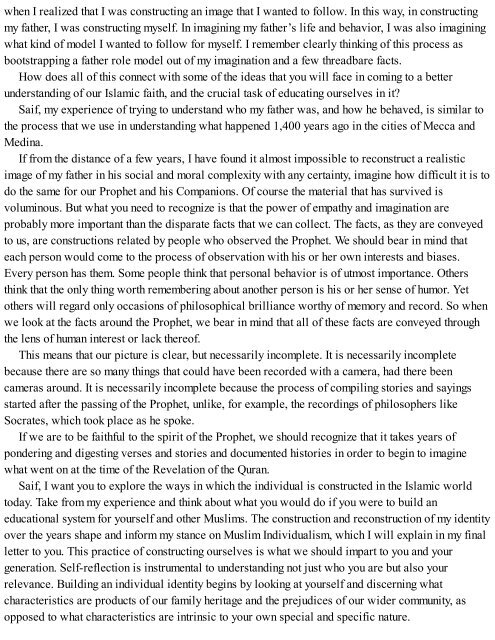1250119847
You also want an ePaper? Increase the reach of your titles
YUMPU automatically turns print PDFs into web optimized ePapers that Google loves.
when I realized that I was constructing an image that I wanted to follow. In this way, in constructing<br />
my father, I was constructing myself. In imagining my father’s life and behavior, I was also imagining<br />
what kind of model I wanted to follow for myself. I remember clearly thinking of this process as<br />
bootstrapping a father role model out of my imagination and a few threadbare facts.<br />
How does all of this connect with some of the ideas that you will face in coming to a better<br />
understanding of our Islamic faith, and the crucial task of educating ourselves in it?<br />
Saif, my experience of trying to understand who my father was, and how he behaved, is similar to<br />
the process that we use in understanding what happened 1,400 years ago in the cities of Mecca and<br />
Medina.<br />
If from the distance of a few years, I have found it almost impossible to reconstruct a realistic<br />
image of my father in his social and moral complexity with any certainty, imagine how difficult it is to<br />
do the same for our Prophet and his Companions. Of course the material that has survived is<br />
voluminous. But what you need to recognize is that the power of empathy and imagination are<br />
probably more important than the disparate facts that we can collect. The facts, as they are conveyed<br />
to us, are constructions related by people who observed the Prophet. We should bear in mind that<br />
each person would come to the process of observation with his or her own interests and biases.<br />
Every person has them. Some people think that personal behavior is of utmost importance. Others<br />
think that the only thing worth remembering about another person is his or her sense of humor. Yet<br />
others will regard only occasions of philosophical brilliance worthy of memory and record. So when<br />
we look at the facts around the Prophet, we bear in mind that all of these facts are conveyed through<br />
the lens of human interest or lack thereof.<br />
This means that our picture is clear, but necessarily incomplete. It is necessarily incomplete<br />
because there are so many things that could have been recorded with a camera, had there been<br />
cameras around. It is necessarily incomplete because the process of compiling stories and sayings<br />
started after the passing of the Prophet, unlike, for example, the recordings of philosophers like<br />
Socrates, which took place as he spoke.<br />
If we are to be faithful to the spirit of the Prophet, we should recognize that it takes years of<br />
pondering and digesting verses and stories and documented histories in order to begin to imagine<br />
what went on at the time of the Revelation of the Quran.<br />
Saif, I want you to explore the ways in which the individual is constructed in the Islamic world<br />
today. Take from my experience and think about what you would do if you were to build an<br />
educational system for yourself and other Muslims. The construction and reconstruction of my identity<br />
over the years shape and inform my stance on Muslim Individualism, which I will explain in my final<br />
letter to you. This practice of constructing ourselves is what we should impart to you and your<br />
generation. Self-reflection is instrumental to understanding not just who you are but also your<br />
relevance. Building an individual identity begins by looking at yourself and discerning what<br />
characteristics are products of our family heritage and the prejudices of our wider community, as<br />
opposed to what characteristics are intrinsic to your own special and specific nature.
















